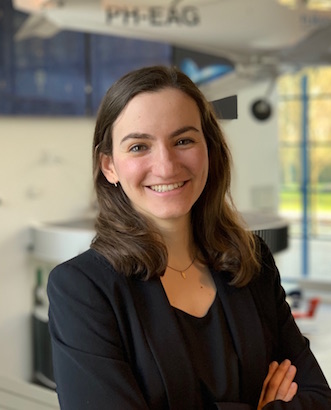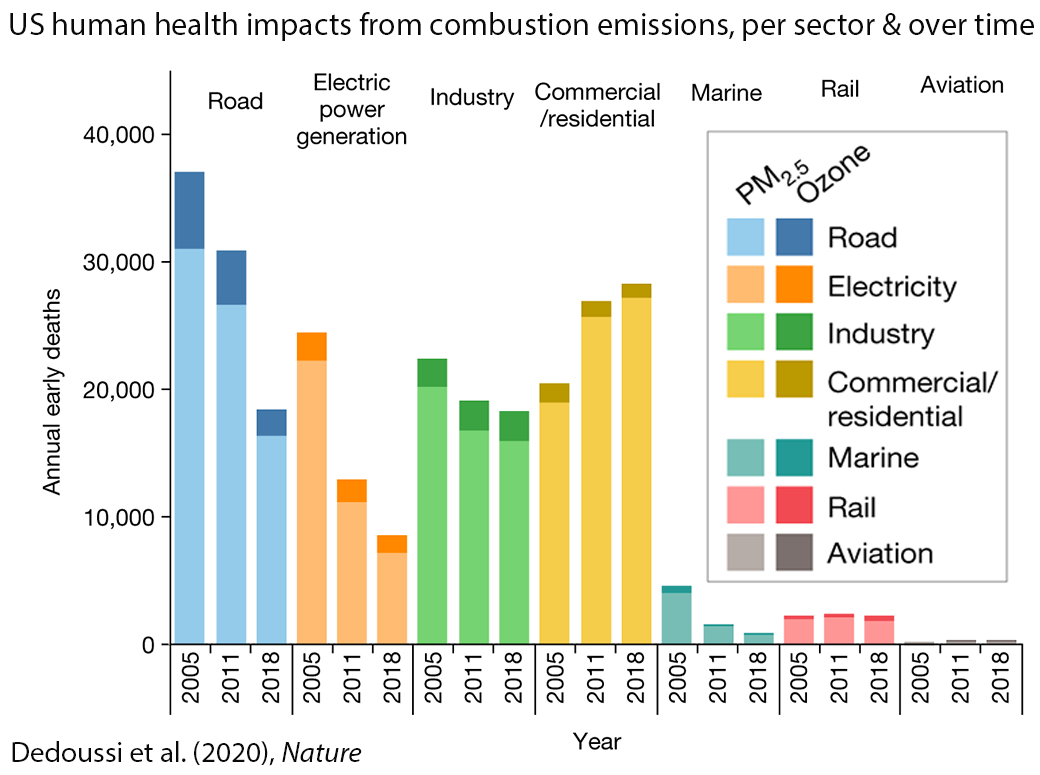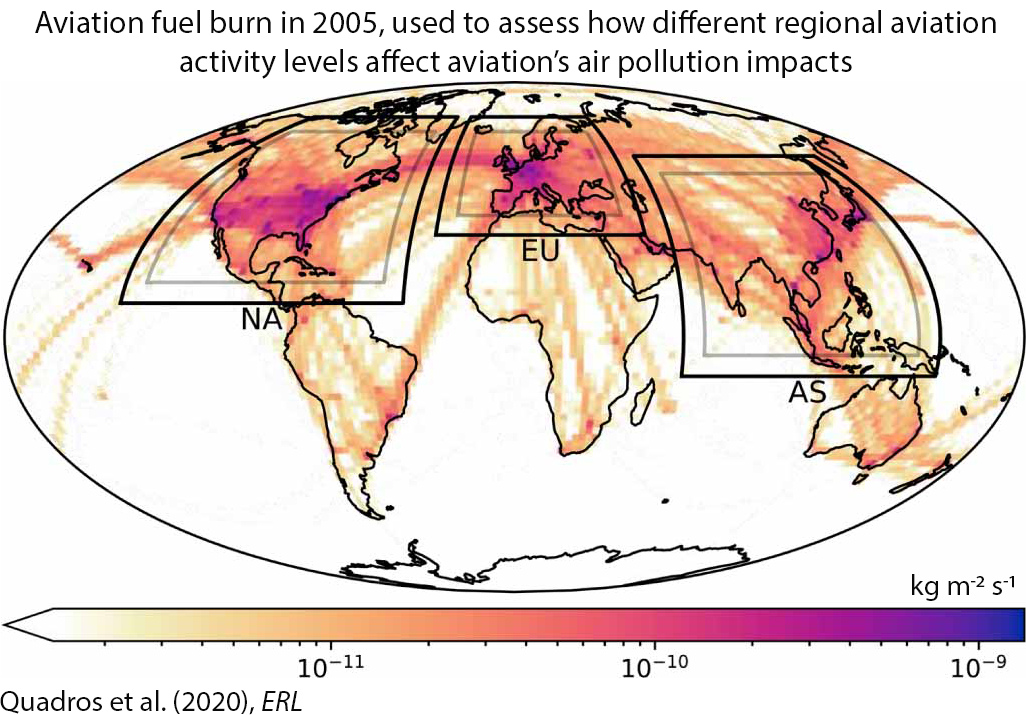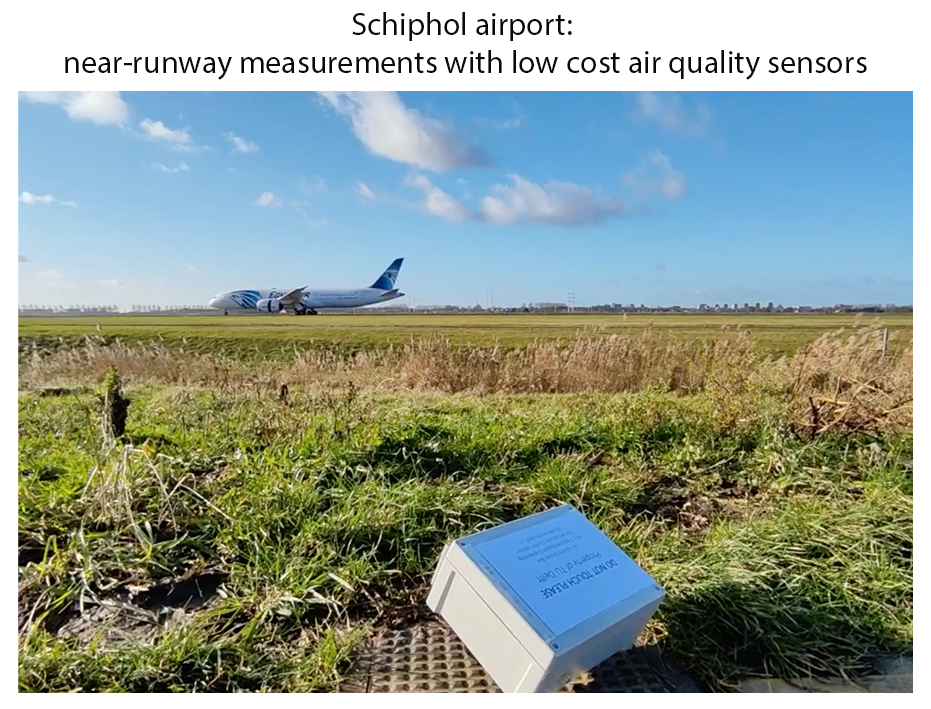Home
Dr Irene Dedoussi is an Associate Professor in Sustainable Aviation and Energy in the Department of Engineering of the University of Cambridge and a member of the Whittle Laboratory. Irene’s work aims to advance our understanding of the environmental impacts of combustion emissions from aviation and other sectors, and contribute to their sustainable growth. Prior to joining the University of Cambridge, Irene was an Associate Professor in the Faculty of Aerospace Engineering of TU Delft, with which she remains affiliated. Irene is a fellow of the Netherlands Academy of Engineering and a member of the Young Adacemy (De Jonge Akademie) of the Royal Dutch Academy of Arts and Sciences (KNAW).
Before joining TU Delft in 2019 as a tenure-track Assistant Professor, Irene was an interim Postdoctoral Associate at MIT. Additionally, she has worked on aeroacoustics at DLR Berlin Institute of Propulsion Technology, and on aircraft engine performance analysis and fleet-wide engine maintenance planning at Lufthansa Technik.
Irene hails from Athens, Greece, and has lived in the US, UK, Germany, and the Netherlands.
Education
- 2014-2018, PhD, Aeronautics and Astronautics, MIT
- 2012-2014, SM, Aeronautics and Astronautics, MIT
- 2008-2012, BA (Hons), MEng (Hons w/ Distinction), Engineering, University of Cambridge
Selected Awards and Recognitions
- 2023: Elected Fellow of the Netherlands Academy of Engineering [link]
- 2023: Best Climate Science paper of 2022 (PhD candidate Jin Maruhashi), TU Delft Climate Action [link]
- 2021: Appointed member of De Jonge Akademie, KNAW (Young Adacemy of the Royal Dutch Academy of Arts and Sciences) [link], [intro video]
- 2020: Veni Grant (Early Career Talent programme), Dutch Research Council (NWO) [link]
- 2020: Forbes 30 under 30, Science and Healthcare Europe list [link]
- 2018: Research pitch competition, 2nd place, Women’s Unconference, MIT Alumni Association [link]
- 2016-17: Martin Family Fellowship for Sustainability, awarded to 10 MIT graduate students [link]
- 2016-17: Amelia Earhart Fellowship, awarded to 35 women globally [link]
- 2016: “Best article of 2015” in Environmental Research Letters, awarded for VW emissions study [link]
- 2015-16: George and Marie Vergottis Fellowship, awarded to one Greek graduate student at MIT
- 2015: MIT Graduate Woman of Excellence Award, awarded to 50 graduate MIT women for leadership and service contributions [link]
- 2014: 2nd Place, 10th annual international Joseph A. Hartman Student Paper Competition
- 2013: Young Woman of the Year, Ariston Foundation, awarded to one Greek woman studying in the USA
- 2012: Admitted member of “The Foundation of the College of St John the Evangelist in the University of Cambridge”, for outstanding performance during undergraduate studies [link]
- 2008-12: George and Marie Vergottis Scholarship, University of Cambridge

Research
Sustainable transportation and energy systems are key to addressing the environmental challenges we face. Our research aims to quantify the environmental impacts of aviation as well as other transportation and energy sectors, and to advance our understanding of how emerging energy sources and technologies can effect change. We take a multi-disciplinary, systems-level approach to analyse mitigation strategies, which include assessments of sustainable engineering design, alternative fuels, energy-efficient operations, and potential regulatory policies.
Interested PhD candidates and postdocs are welcome to get in touch.
Combustion by-products from energy, industrial and transportation sectors impact the atmospheric composition, leading to air pollution, nitrogen deposition, and adverse climate impacts. We assess the atmospheric and human health impacts of different sectors and how these impacts spread from the emission location. Since aviation emissions occur at high altitudes, the air transport sector forms a special-interest category for our research, as we aim to understand the unique underlying physical and chemical mechanisms of this sector's impacts.

The transition to sustainable transportation and energy requires a combination of regulatory, operational and technological changes, each of which occur on different timelines. In parallel, the atmospheric composition, governed by a nonlinear system of coupled relations, is evolving due to overall emissions’ and other changes. We are interested in analysing different approaches to sustainable aviation and other sectors, taking into account the evolving atmospheric co-benefits and trade-offs in the overall systems-level optimisation. We primarily focus on the long-term sustainable growth of aviation, inclusive of emerging modes of transport, such as civil supersonic aircraft, as well as the effects of alternative fuels such as ammonia and hydrogen.

Increasingly more and better quality observational data are becoming openly available. These include data from atmospheric measurement stations and satellite observations of atmospheric composition, as well as source (e.g. aircraft) activity data. In addition, utilising low cost sensors it has become easier to obtain information tailored to the source of interest, while at the same time enabling crowd-sourcing of data. We utilise this abundant data towards the improved understanding and monitoring of the atmospheric effects of real-world aviation emissions and possible interventions.
Team
PhD candidates
- Irina Besnea
- Jurriaan van 't Hoff
- Luccas Kavabata
- Jin Maruhashi
- Flávio Quadros (defended on 01/2024)
- Zain Robson
Postdocs
MSc students
- Samuel Otterloo (2022-2024)
- Yvar Vliex (2023-2024)
- Xander van Hal (2023-2024)
- Jeltes de Weerd (at to70)(2023-2024)
- Tom van Cranenburgh (2023-2024)
- Jaime Aalders (2023-2024)
- Lidia Rzeplinska (2021-2023)
- Edoardo Verzotti (2022-2023)
- Rik Goudswaard (2021-2023)
- Rick Nelen (2022-2023)
- Liesbeth Wijn (2022-2023)
- Harry Aldridge (2020-2022)
- Mathieu Blanke (2020-2021)
- Lodewijck Foorthuis (at SRON, 2021-2022)
- Mariijn van Loo (2020-2021)
- Jeff Maes (2020-2021)
- Pratik Rindhe (at SRON, 2021-2022)
- Vincent Verhoeven (2019-2020)
Other
- Jeff Maes, Researcher, 2021-present
- Vincent Verhoeven, Researcher, 2020-2021
- Morgane Bourgeois, MSc Exchange Research Internship, 2020
In the news
Publications
Index
Journal publications
- van 't Hoff, J., Hauglustaine, D., Pletzer, J., Skowron, A., Grewe, V., Matthes, S., Meuser, M.M., Thor, R.N., Dedoussi, I.C. (2025) “Multi-model assessment of the atmospheric and radiative effects of supersonic transport aircraft.” Atmospheric Chemistry and Physics, [In Press].
- van 't Hoff, J., Grewe, V., Dedoussi, I.C. (2024) “Sensitivities of ozone and radiative forcing to supersonic aircraft emissions across two flight corridors.” Journal of Geophysical Research: Atmospheres, 129, 22, e2023JD040476.DOI: 10.1029/2023JD040476
- Rao, P., Dwight, R., Singh, D., Maruhashi, J., Dedoussi, I.C., Grewe, V., Frömming, C. (2024) “The ozone radiative forcing of nitrogen oxide emissions from aviation can be estimated using a probabilistic approach.” Communications Earth & Environment , 5, 558.
- Dedoussi, I.C., Henze, D.K., Eastham, S.D., Speth, R.L., Barrett, S.R.H. (2024) “Development of the adjoint of the unified tropospheric–stratospheric chemistry extension (UCX) in GEOS-Chem adjoint v36.” Geoscientific Model Development, 17, 5689–5703.
- Maruhashi, J., Mertens, M., Grewe, V., Dedoussi, I.C. (2024) “A multi-method assessment of the regional sensitivities between flight altitude and short-term O3 climate warming from aircraft NOx emissions.” Environmental Research Letters, 19, 054007.
- Henneman, L.R.F., Choirat, C., Dedoussi, I.C., Dominici, F., Roberts, J., Zigler, C.M. (2023) “Mortality risk from United States coal electricity generation.” Science 382 (6673), 941-946.
- Quadros, F.D.A., van Loo, M., Snellen, M., Dedoussi, I.C. (2023) “Nitrogen deposition from aviation emissions.” Science of the Total Environment, 858, 3, 159855.
- Maruhashi, J., Grewe, V., Frömming, C., Jöckel, P., Dedoussi, I.C. (2022) “Transport patterns of global aviation NOx and their short-term O3 radiative forcing – a machine learning approach.” Atmospheric Chemistry and Physics 22, 14253–14282.
- Quadros, F.D.A., Snellen, M., Sun, J., Dedoussi, I.C. (2022) “Global civil aviation emissions estimates for 2017-2020 using ADS-B data.” Journal of Aircraft 59, 6, 1394-1405.DOI: 10.2514/1.C036763
- Fritz, T.M., Dedoussi, I.C., Eastham, S.D., Speth, R.L., Henze, D.K., Barrett, S.R.H. (2022) “Identifying the ozone-neutral aircraft cruise altitude.” Atmospheric Environment 276, 119057.
- Verhoeven, V.B., Dedoussi, I.C. (2022) “Annual satellite-based NDVI-derived land cover of Europe for 2001-2019.” Journal of Environmental Management 302A, 15, 113917.
- Dedoussi, I.C. (2021) “Implications of future atmospheric composition in decision-making for sustainable aviation.” Environmental Research Letters 16, 031002.
- Valera-Medina, A., Amer-Hatem, F., Azad, A. K., Dedoussi, I.C., de Joannon, M., Fernandes, R. X., Glarborg, P., Hashemi, H., He, X., Mashruk, S., McGowan, J., Mounaim-Rouselle, C., Ortiz-Prado, A., Ortiz-Valera, A., Rossetti, I., Shu, B., Yehia, M., Xiao, H., Costa, M. (2021) “Review on Ammonia as a Potential Fuel: From Synthesis to Economics.” Energy & Fuels 35, 9, 6964-7029.
- Henneman, L.R.F., Dedoussi, I.C., Casey, J.A., Choirat, C., Barrett, S.R.H., Zigler, C.M. (2021) “Comparisons of simple and complex methods for quantifying exposure to individual point source air pollution emissions.” Journal of Exposure Science & Environmental Epidemiology 31, 654-663.
- Quadros, F.D.A., Snellen, M., Dedoussi, I.C. (2020) “Regional sensitivities of air quality and human health impacts to aviation emissions.” Environmental Research Letters 15, 105013.
- Dedoussi, I.C., Eastham, S.D., Μonier, E., Barrett, S.R.H. (2020) “Premature mortality related to United States cross-state air pollution.” Nature 578, 261-265.
- Grobler, C., Wolfe, P.J., Dasadhikari, K., Dedoussi, I.C., Allroggen, F., Speth, R.L., Eastham, S.D., Agarwal, A., Staples, M.D., Sabnis, J., Barrett, S.R.H. (2019) “Marginal climate and air quality costs of aviation emissions.” Environmental Research Letters 14, 114031.
- Dedoussi, I.C., Allroggen, F., Flanagan, R., Hansen, T., Taylor, B., Barrett, S.R.H., Boyce, J.K. (2019) “The co-pollutant cost of carbon emissions: an analysis of the U.S. electric power generation sector.” Environmental Research Letters 14, 094004.
- Chossière, G.P., Malina, R., Ashok, A., Dedoussi, I.C., Eastham, S.D., Speth, R.L., Barrett, S.R.H. (2017) “Public health impacts of excess NOx emissions from Volkswagen diesel passenger vehicles in Germany.” Environmental Research Letters 12, 034014.
- Barrett, S.R.H., Speth, R.L., Eastham, S.D., Dedoussi, I.C., Ashok, A., Malina, R., Keith, D. (2015) “Impact of the Volkswagen emissions control defeat device on US public health.” Environmental Research Letters 10, 114005.["Best article of 2015" award]
- Dedoussi, I.C., Barrett, S.R.H. (2014) “Air pollution and early deaths in the United States. Part II: Attribution of PM2.5 exposure to emissions species, time, location and sector.” Atmospheric Environment 99, pp. 610-617.
- Ashok, A., Dedoussi, I.C., Yim, S.H.L, Balakrishnan, H., Barrett, S.R.H. (2014) “Quantifying the air quality-CO2 tradeoff potential for airports.” Atmospheric Environment 99, pp. 546-555.
Conference papers
- Quadros, F.D.A., Snellen, M., Dedoussi, I.C. (2022) “Recent and projected trends in global civil aviation NOx emission indices” AIAA SciTech, 3-7 January 2022, San Diego, USA & Virtual. AIAA 2022-2051.DOI: 10.2514/6.2022-2051
- Sun, J., Dedoussi, I.C. (2021) “Evaluation of aviation emissions and environmental costs in Europe using OpenSky and OpenAP” presented at the OpenSky Symposium, 18-19 November 2021, Brussels, Belgium & Virtual, published in Engineering Proceedings, 13 (1), 5.
- Dedoussi, I.C., Hynes, T.P., Siller, H. (2013) “Investigating landing gear noise using fly-over data: the case of a Boeing 747-400.” 19th AIAA/CEAS Aeroacoustics Conference (34th AIAA Aeroacoustics Conference) 27-29 May 2013, Berlin, Germany. AIAA 2013-2115.DOI: 10.2514/6.2013-2115
Contributions to policy documents & white papers
- Accelerating the path towards carbon-free aviation, Sustainable and Energy Efficient Aviation CoE & Aeronautics Research Centre Niedersachsen, July 2022 [Author].
- MER 3456. Evaluation of nitrogen calculations for Lelystad Airport (Evaluatie stikstofberekeningen Lelystad Airport), Dutch Commission for Environmental Assessments, Commissie voor de milieueffectrapportage (Commissie MER), Utrecht, March 2020 [Contributor].
- Advisory Board on Nitrogen Problem: Advice on the aviation sector (Adviescollege Stikstofproblematiek: Advies luchtvaartsector), Dutch Advisory Board on Nitrogen Problem, Adviescollege Stikstofproblematiek, The Hague, January 2020 [Expert panel member].
- ICAO-CAEP/10 Agenda Item 5: CO2 Standard development. CAEP/10-IP/24. “Global cost-benefit analysis of ICAO CO2 standard stringency options.” ICAO, Montréal, February 2016 [Contributor].
Theses
- Dedoussi, I.C. (2018) “Adjoint sensitivity analysis of the atmospheric impacts of combustion emissions.” Massachusetts Institute of Technology, Department of Aeronautics & Astronautics, Ph.D. Thesis. MIT DSpace.
- Dedoussi, I.C. (2014) “Air pollution and early deaths in the United States: Attribution of PM2.5 exposure to emissions species, time, location and sector.” Massachusetts Institute of Technology, Department of Aeronautics & Astronautics, S.M. Thesis. MIT DSpace.
- Dedoussi, I.C. (2012) “Landing gear noise analysis of a Boeing 747-400”. Department of Engineering, University of Cambridge, M.Eng. Thesis.
Teaching
At TU Delft
- AE4462 Aircraft Emissions and Climate Effects (MSc level, lecturer), Spring 2019, 2020, 2021, 2022, 2023, 2024
- AE2223-I Test, Analysis & Simulation (BSc level, project tutor), Spring 2019, 2020, 2021, 2022, 2023
- AE3200 Design Synthesis Exercise (BSc level, project tutor), Spring 2020, 2022
- Sustainable Aviation: The Route to Climate-Neutral Aviation (edX MOOC, general public level, lecturer), launched Spring 2021
At MIT
- 16.715 Aerospace, Energy, and the Environment (SM level, guest lecturer) Fall 2017, 2018
- MIT Kaufman Teaching Certificate Program, Summer 2015
Contact
Dr Irene C. Dedoussi
Office: Whittle Laboratory, Room WEG-24
Telephone: +44 (0)1223 746973
Address:
1 JJ Thomson Avenue,
Cambridge, CB3 0DY
United Kingdom
Email: icd23@cam.ac.uk

